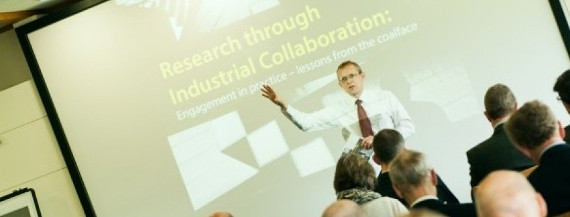Insights shared to make collaborative research work better

Delegates gathered at the Engineering Department’s biennial conference on the subject, Engagement in practice – lessons from the coalface, chaired by Tim Minshall at the Moller Centre on 1 May.
Speakers from Boeing, Dyson, PragmatIC Printing, the John Lewis Partnership and the Engineering Department described their research partnerships, successes and failures from a wide range of collaboration models over very different timeframes.
Despite the differing backgrounds, key messages emerged about the importance of flexibility to seize the serendipitous discovery, continuity to build trust and deeply competent teams, and frequent interaction to build a shared understanding of each partner’s priorities and imperatives.
Philip Woodall, of the Distributed Information and Automation Laboratory (DIAL), spoke about A decade of building and refining a strategic research partnership with Boeing. Eoin O’Sullivan and Tomas Coates Ulrichsen, of the Centre for Science, Technology & Innovation Policy (CSTI), spoke about Building and Sustaining Long Term Strategic University-Industry Partnerships: Experiences and Insights from the UK and US.
Other topics included how to manage IP and a portfolio of projects as a relationship evolves, and how to bring others into the working relationship, both academic colleagues to bring new disciplines and different business units to exploit new capabilities.
Reports of the conference highlights are available as a short report and a more detailed report.
More information is available by contacting Dr Charles Boulton (cb683@cam.ac.uk), manager of the Engineering Department’s Theme: Inspiring Research through Industrial Collaboration.
Date published
23 June 2014










